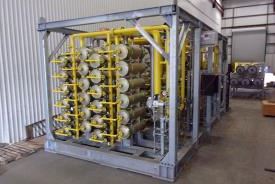Cleaning Q&A: Maintenance of Process Chemicals
Could I use a hydrometer to measure pH and fluid titration?
Q. I am inquiring about aqueous pre-cleaning solution and passivation fluid titration/pH measuring. I am looking for accurate, fast and cost-effective means to monitor these. Could I use a hydrometer to measure?
A. There are some means to speed up testing, maintenance and control of process chemicals like alkaline and acid cleaners, although a hydrometer cannot be used for most of these. A hydrometer is useful to determine the specific gravity of a solution and is frequently used to establish acid concentrations. However, this is typically applicable for acids of significantly higher concentrations than used in industrial cleaning and coating lines.
Featured Content
One exception to this may be an industrial nitric acid passivating line. In this case, you will use nitric acid in the range of 25–50 percent by volume and not necessarily requiring a very tight process window. In this case, a hydrometer would be reasonably effective to establish an approximate nitric acid concentration and would be very quick. Notably, hydrometers are accurate and calibrated to a specific temperature. In my experience using them for a different control method, most are available at 60°F, so a correction factor must be applied if measuring a liquid with a different temperature.
Most other process chemicals are more dilute, require a narrower operating window and generally have multiple components that may need monitoring. In many cases, a titration is necessary to verify the concentration of a cleaner, or its free and total alkalinity. There are industrial sensors that correlate and minimize some of the regular labor associated with this, as well as industrial pH meters and ion selective electrodes to automate dosing. However, at some point, it would be advisable to verify the full tank chemistry through the supplier’s recommended test methods, which are often titration based. Frequency would be dependent on production volumes.
Originally published in the November 2015 issue.
RELATED CONTENT
-
Powder Coat MDF for an Enviable Finished Product
Cabinet maker says powder coating on wood offers more benefits.
-
Cleaning Magnesium
Question: What is the recommended chemical cleaning process and composition prior to electroless nickel plating for magnesium?
-
Conversion Coatings: Phosphate vs. Zirconium
Both phosphate-based and zirconium coatings have their advantages, but zirconium is fast becoming the pretreatment of choice.



















